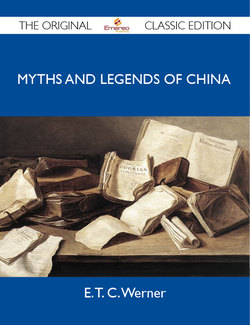Читать книгу Myths and Legends of China - The Original Classic Edition - Werner E - Страница 2
На сайте Литреса книга снята с продажи.
ОглавлениеMencius
Chuang Tzu's Super-tao
Chuang Chou (fourth and third centuries B.C.), generally known as Chuang Tzu, the most brilliant Taoist of all, maintained with Lao Tzu that the universe started from the Nameless, but it was if possible a more absolute and transcendental Nameless than that of Lao Tzu. He dwells on the relativity of knowledge; as when asleep he did not know that he was a man dreaming that he was
a butterfly, so when awake he did not know that he was not a butterfly dreaming that he was a man.8 But "all is embraced in the obliterating unity of the tao, and the wise man, passing into the realm of the Infinite, finds rest therein." And this tao, of which we hear so much in Chinese philosophy, was before the Great Ultimate or Grand Terminus (t'ai chi), and "from it came the mysterious existence of God [ti]. It produced Heaven, it produced earth."
Popular Cosmogony still Personal or Dualistic
These and other cosmogonies which the Chinese have devised, though it is necessary to note their existence in order to give a just idea of their cosmological speculations, need not, as I said, detain us long; and the reason Page 92why they need not do so is that, in the matter of cosmogony, the P'an Ku legend and the yin-yang system with its monistic elaboration occupy virtually the whole field of the Chinese mental vision. It is these two--the popular and the scientific--that we mean when we speak of Chinese cosmogony. Though here and there a stern sectarian might deny that the universe originated in one or the other of these two ways, still, the general rule holds good. And I have dealt with them in this order because, though the P'an Ku legend belongs to the fourth century A.D., the I ching dualism was not, rightly speaking, a cosmogony until Chou Tun-i made it one by the publication of his T'ai chi t'u in the eleventh century A.D. Over the unscientific and the scientific minds of the Chinese these two are paramount.
Applying the general principles stated in the preceding chapter, we find the same cause which operated to restrict the growth of mythology in general in China operated also in like manner in this particular branch of it. With one exception Chinese cosmogony is non-mythological. The careful and studiously accurate historians (whose work aimed at being ex veritate, 'made of truth'), the sober literature, the vast influence of agnostic, matter-of-fact Confucianism, supported by the heavy Mencian artillery, are indisputable indications of a constructive imagination which grew too quickly and became too rapidly scientific to admit of much soaring into the realms of fantasy. Unaroused by any strong stimulus in their ponderings over the riddle of the universe, the sober, plodding scientists and the calm, truth-loving philosophers gained a peaceful victory over the mythologists. Page 93
1 Cf. Aristotle's belief that bugs arose spontaneously from sweat.
2 For the Buddhist account see China Review, xi, 80-82.
3 Compare the Japanese legend, which relates that the Sun-goddess was induced to come out of a cave by being tempted to gaze at
herself in a mirror. See Myths and Legends of Japan, F. Hadland Davis, pp. 27-28.
4 See Myths of the Norsemen, by H. A. Guerber. These resemblances and the further one--namely, the dualism in the prechaotic epoch (a very interesting point in Scandinavian mythology)--illustrate the danger of inferring identity of origin from similarity of physical, intellectual, or moral results. Several remarkable parallelisms of Chinese religious and mythological beliefs with those re-
26
